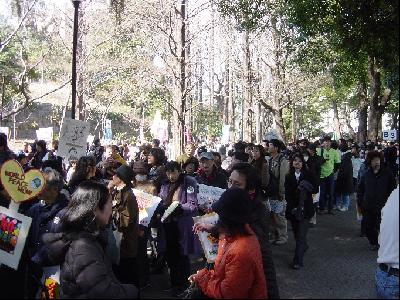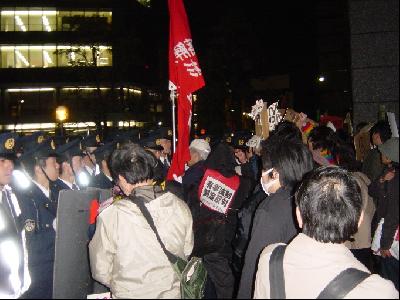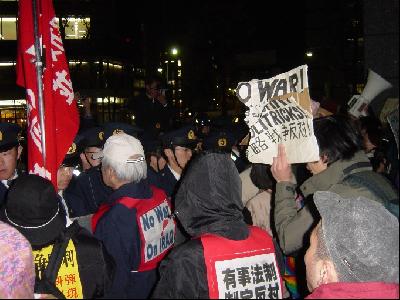Baltimore IMC : http://www.baltimoreimc.org
News :: Activism
Streets of Tokyo Erupt in Antiwar Fervor
As the U.S. began its bombing of Iraq, hundreds of thousands protested around the world and in the U.S. Former Baltimore activist John Cassidy reports on anti-war activism in and around Tokyo, Japan.

The other day I saw an MSNBC story, “Antiwar protests around the world,”which stated the number of protestors at a March 21st Tokyo peace march as being “in the hundreds.” I was at that march and while MSNBC’s story is accurate a more straightforward accounting of the number of people should have included a multiplier of at least 500. The national Japanese daily, Asahi Shimbun, in their coverage of the same event quoted rally organizers who estimated the number of protestors at 50,000 (www.asahi.com/english/international/K2003032200120.html). While it may be misleading for MSNBC to say, “hundreds,” I will give them the benefit of the doubt and suppose they left out “x 500” for the sake of brevity. So when I see other stories by MSNBC that cite numbers of innocent children maimed and killed by US soldiers I’ll know to read that number as “x 500.” If there is one thing I’ve come to realize from living in a foreign country it’s that learning a foreign language is quite difficult. As a somewhat foreign country is taking shape under the artful guidance of the Bush Administration I’m slowly learning how to understand the language of the American media.
TOKYO EMBASSY UNDER SIEGE


Japanese police presence at US military bases throughout Japan that are home to some 50,000 US servicemen and women has also been increased lately. A rocket attack on Camp Zama, located just southwest of Tokyo, last December highlights the strain on US relations in this usually peaceful country and serves as a frightening reminder to many that not all opposition is nonviolent.
SIGNS OF RESISTANCE TO WAR ARE EVERYWHERE
Even off the beaten path in neighborhoods that are known for being warm beds of political rest opposition to the war is fervent. My neighborhood of Tsurumi, Yokohama, is one such place. Here, members of Tsurumi Peace Link, a community-based organization whose mission is to provide a local perspective on a global vision of peace, have encountered a lot of public support in their small organizing efforts against the war. For a recent event that was designed to raise awareness of the effects depleted uranium munitions and sanctions have had on the lives of ordinary Iraqis they said they enjoyed the support of nearly everyone they talked to, from the pastor of the local Catholic Church here who made the event the focus of his Sunday sermon to the local baker who gave fliers announcing the event to all her customers. Throughout the neighborhood are posters announcing the event that include a photo of an Iraqi family from the Baghdad Snapshot Action (nationalphilistine.com/baghdad/index2.html). The event drew a diverse cross-section from this densely populated community that included construction workers, local businessmen, educators, homemakers and both old and young alike who were motivated to write a short message to their political representatives on the postcards provided at the forum.
In November Peace Link member and former Baltimore resident, Misa Yasuhiro took part in an antiwar effort aimed at members of the Japanese Diet. Their action was modeled after a similar effort by activists in the US to lobby Congress. Activists delivered copies of books with photos of Iraqi children who have suffered the effects of DU munitions, "A Different Nuclear War, Children of the Gulf War" by Takashi Morizumi. She believes the action had an impact because the next day a few Diet members used the book in their addresses to persuade the government from supporting the US war against Iraq. On the other hand, while visiting a member of the ruling Liberal Democratic Party, a secretary became very angry and scolded her for bringing her 3-year-old son with her, saying, "This is absolutely no place for children." Recently Prime Minister Koizumi echoed that sentiment by giving his unequivocal support to the US attack on Iraq. In a statement to the press, Koizumi later said, “I hope the public will in time come to understand the decision.” Time may be running out for Koizumi as the war on Iraq increasingly becomes a focal issue in current elections and threatens to weaken the position of his party.
JAPAN NOT LIVING UP TO ITS RESPONSIBILITIES
Speaking at the Peace Link forum was peace activist, Kayoko Ikeda, who talked of her experience working with refugees in Japan. In the last ten years Japan has accepted less than 50 refugees. While under no obligation to accept any, Japan has in fact supported three major conflicts, the Persian Gulf War, Afghanistan and currently the war on Iraq, that have been a contributing factor to the increase in the number of refugees worldwide. Most who come to Japan seeking refugee status are immediately arrested upon arrival at Narita Airport and detained at an Immigration jail where they await a review of their case and in the majority of instances deportation and a most uncertain future. Ikeda said she recently asked a man from Afghanistan why he chose to come to Japan rather than Canada or Australia where he would no doubt be a free man. He said that after learning in school of the atomic bombings of Hiroshima and Nagasaki and that Japan had forgiven the US for that atrocity he believed the country would be sympathetic to his plight. His decision has taught him a painful lesson. Last summer an Afghan man whose case for refugee status was pending review committed suicide after learning that his wife and children were killed in a US bombing raid on Afghanistan.
OPENING OLD WOUNDS
The attack on Iraq comes less than a week after the 58th anniversary of the oft forgotten firebombing of Tokyo at the close of World War II. In one single night almost 100,000 civilian residents were killed in the fire released from nearly 17000 tons of napalm filled bombs dropped by American B-29’s that destroyed a 16 square mile area of the city. While the anniversary of the atomic bombings that destroyed the cities of Hiroshima and Nagasaki are recalled every year in official ceremonies the fire bombings of the civilian residential areas of Tokyo and other cities across Japan are usually not even faintly whispered of. These days, however, in living rooms and the tiny neighborhood bars, and cafes that dot the modern Tokyo landscape the burning embers of that dark past which have lied dormant in the recesses of the memories of local residents here have been rekindled by televised images of the US attack on Baghdad. For those who lived through it, the memories of the death and destruction that fell on them from above have once again come back to haunt them. In a letter to a Japanese newspaper, Takehiko Kasahara, a survivor of the Tokyo bombings, wrote,“Were the mass civilian killings in Tokyo, Kobe, Hiroshima and Nagasaki justified? It's hard to say. I am full of ambivalence. …In my opinion, it is how we are [act] now that determines whether there is redemption; this goes for both Japanese and Americans.”
While the administration of Prime Minister Junichiro Koizumi has backed the US war on Iraq, 80 % of Japanese citizens, according to a recent Kyodo news poll, are opposed to supporting the war. As angry talk of the Us attack on Iraq spills over from the quiet cafes and into the streets of Tokyo some see a link with their own past experiences and the bombing of civilians in Iraq. People here see history repeating itself as the US leaves a trail of carnage in its drive to create its new world order. In another letter to the editor, Takeru Toki, a survivor of the firebombings of Kobe who still holds childhood memories of those air raids that turned so many homes and people to ashes recalls that chain of devastating events as being horrible but perhaps, he confides, not as terrible as the horrors inflicted on the people of Asia by the Japanese military forces at that time. Although many would disagree, he believes that maybe the bombing of Tokyo ended the war sooner and perhaps saved the lives that surely would have been lost had the war lasted longer than it did. He writes, "If there is anything we should learn from history, it is that war, no matter what kind, turns us into beasts."
Rising Up to Forge a Path to Peace
When President Bush in his speech to rally the nation for war stated that, “we will accept no outcome but victory,” I was reminded of the words of another American who once lived in Japan. Douglas Macarthur said, "In war, there is no substitute for victory." It is a statement which neatly underscores the significance of international efforts to seek a substitute for war. The opportunity to prevent war can be seen in the smoke rising over Baghdad and perhaps our only redemption now may be that in rising from the ashes of that destruction we can somehow break the chains that bind us to repeating the mistakes of the past. Throughout Japan people have risen up and taken to the streets to forge a path to that redemption. Reaching the end of that path depends on whether our leaders will follow or not.
Views
Information
Search
This site made manifest by dadaIMC software
